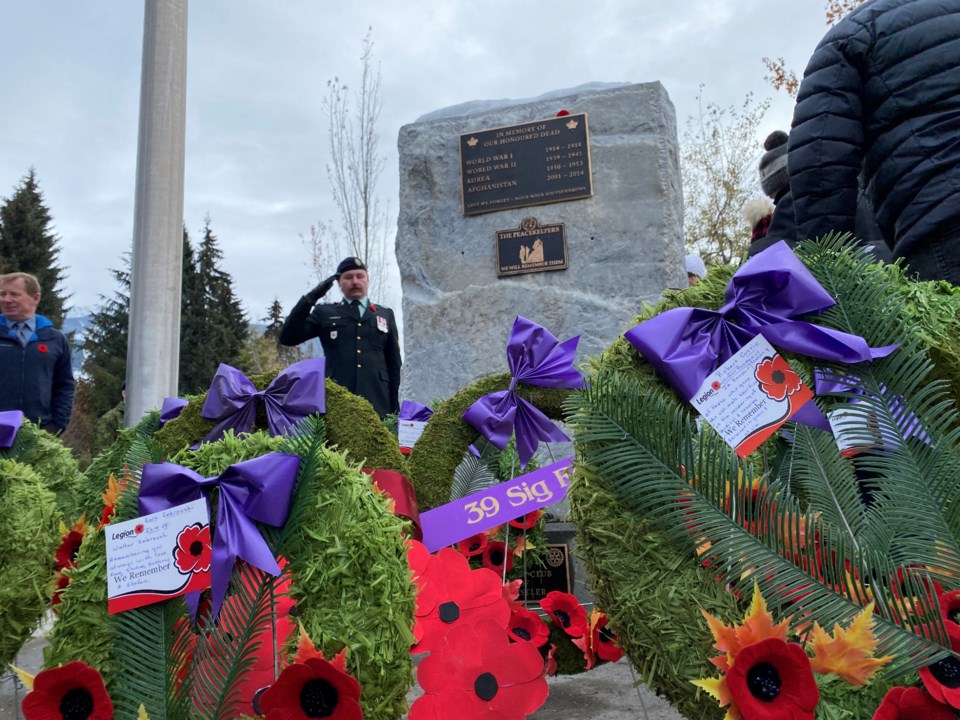The following text was delivered by Anne Townley at Whistler’s Service of Remembrance on Nov. 11, 2022. Words by G.D. Maxwell.
Once again we gather together on this November morning to remember. Members of Whistler's community, visitors, guests, colour guard, uniformed service personnel, we all gather regardless of the weather to honour those who have fought, those who have lived, those who have died, those who struggled at home to keep some semblance of country and community moving forward.
Most of all we gather to remember. Remember the wars, the police actions, the breakdown of diplomacy... the carnage. For if we don't remember, if we turn our attention away from the world's bloody history, we devalue the efforts of all those who came and fought and died before.
And forgetting is a small step towards finding ourselves engaged in a new conflagration those who come after us will have to gather to remember. Remember because we forgot. Because someone forgot. Because failing to remember cast a pall over the future.
This year, unlike many years past when we've gathered, that pall looms larger than it has since the end of the Second World War. In the absence of remembering the horrors of the past, the ceaseless human conflict between imperialism and nationalism, the desire to build empires, to regain lost glory, to devalue human life, is threatening to expand from a land far from us and pull the world into the black hole of conflict once again.
This day, Remembrance Day, originally called Armistice Day, was created in Canada in 1931 to mark the end of the hostilities of the First World War, the war to end all wars.
The geo-political causes of World War I were many. The decline of the Ottoman Empire and the growing strength of Austria-Hungary, the nationalist movements in the Balkans the alignment of what would come to be known as the Central Powers and the Allied Powers laid the foundation.
But it was the act of one man, Gavrilo Princip, on July 28, 1914, that lit the fuse. A Serbian nationalist chaffing under Austro-Hungarian rule, he shot and killed Archduke Franz Ferdinand, heir to the Austro-Hungarian Empire, in Sarajevo, Bosnia. The world was at war.
It was a war like none the world had ever seen. Advances in military technologies and the horrors of trench warfare led to the deaths of some 20 million military personnel and civilians and the wounding of that many more.
And so, we remember.
The war to end all wars, with all its horrors, didn't. Instead it laid the ground work for World War II. Which was, in turn, sparked by one man who rallied a country to hold its collective head up... and be great again.
The Treaty of Versailles ended World War I. It also punished Germany for that country's role in the war. It extracted heavy financial reparations, demilitarized the country, prohibited German unification with Austria and stripped the country of many territories and overseas colonies. The ensuing Great Depression resulted in the Weimar Republic falling to Adolph Hitler and the Nazi Party in 1933.
Six years later, Hitler invaded Poland, Great Britain and France declared war on Germany.
A year later, Benito Mussolini threw Italy's support behind Germany, attacking the French Alps and later Greece.
A year after that, Isoroku Yamamoto, the commander-in-chief of the combined fleet of the Imperial Japanese Navy, executed the plan he'd created to attack the United States pacific fleet at Pearl Harbor, plunging the U.S. and Japan into the war, a war most of the rest of the world was eventually drawn into, a war that became the most deadly war in history.
Hitler in Germany. Mussolini in Italy. Yamamoto in Japan. Three men; three proximate acts; 70 to 80 million people erased from the Earth by the time peace was finally declared.
We remember... Again!
The last surviving veteran who served in World War I died in 2011 at the age of 110. It is a war personally remembered by only those few who were very young while it raged. Those here today, born later, remember.
Veterans of World War II still number in the hundreds of thousands. Each and every one remembers as though it was yesterday. So do those who lived through the experience at home. Some are here today. We remember with them.
There are no veterans of the war currently being fought in Ukraine, only active duty personnel. Another war started by one man. One man who has chosen to not remember.
As we gather here today to honour and remember, we are less safe than we were a year ago. For the first time in decades one man cavalierly tosses out the idea of deploying nuclear weapons and the world shudders in horror. One man dismisses the allegations that the forces he's unleashed have committed crimes against humanity. One man threatens to draw the rest of the world into bloody conflict yet again.
But in too many other places around the world, one man—always a man—holds the reins of power and has the potential to use that power in a way future gatherings will have to look back on and remember. Whether to expand influence, claim or reclaim disputed territories, avenge perceived wrongs, pit one deity against another or simply subjugate another people, the dogs of war are tethered on slim leashes and strain to be let slip.
But today, we remember. We honour those who have served during and those who have lived through war. We hope those who still serve will serve only in peace.




